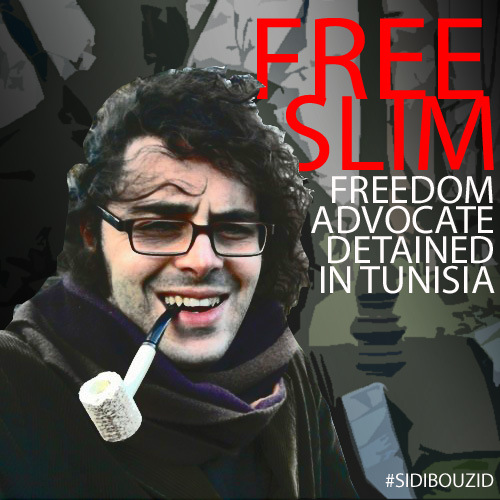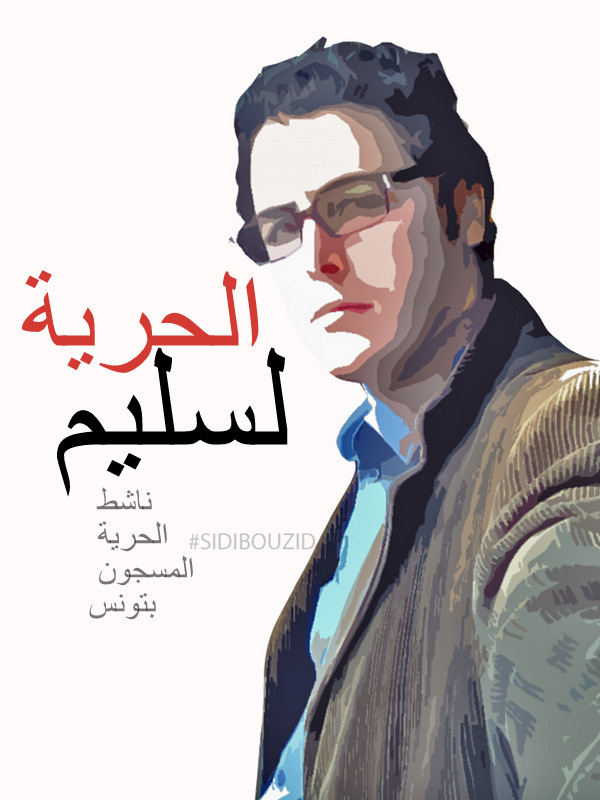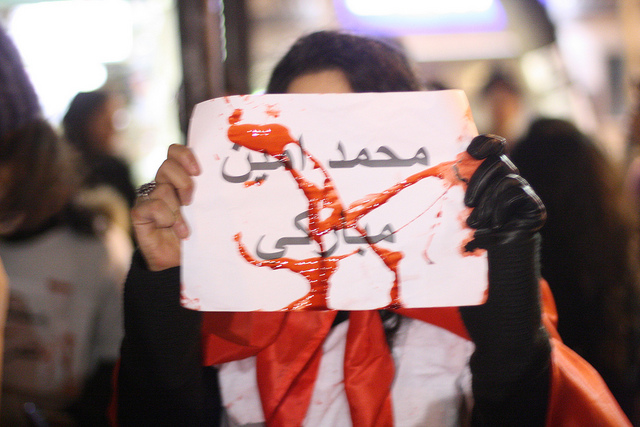Od blisko miesiąca media mainstreamowe informują o zamieszkach w Tunezji, powracających turystach, upadku prezydenta i nowych władzach. W Polsce nie słychać dyskusji na temat wykorzystania mediów społecznościowych jako katalizatora tych przemian. Jak było? I jaką rolę odegrały w tym Facebook i Twitter? DI prezentuje historię wydarzeń za pomocą cytowań z popularnych serwisów społecznościowych.
Autor już na wstępie przeprasza, że łamie wszelkie kanony czytania oraz publikacji online. Poniższy artykuł jest długi, przeładowany filmami oraz zdjęciami. Przeglądarka może dostać "czkawki", dlatego sugerujemy odczekać chwilę, nim przystąpią Państwo do lektury.
Młokos, sprzedawca warzyw, święty i bohater
Sidi Bouzid, miejscowość oddalona o ponad 4 godziny jazdy od stolicy kraju - Tunisu, zamieszkana przez około 40 tysięcy ludzi i niemalże zapomniana w przewodnikach turystycznych. To tu właśnie dochodzi do wydarzeń, które rozpoczną tzw. rewolucję jaśminową. "Mr Bouazizi jest bohaterem, jest świętym, kocham go ponieważ uwolnił mnie od mojego strachu... strachu przed władzą". Kim był wcześniej? Od nastoletnich lat sprzedawał warzywa na miejscowym targu, gdy władze odmówiły mu prawa do handlu oraz zabrały jego stragan na kółkach, udał się do miejscowego przedstawicielstwa. Kobieta, urzędniczka, u której próbował odzyskać swoją własność, spoliczkowała go.
Mohammed Bouazizi wraca na rynek, w pobliże siedziby lokalnego gubernatora i dokonuje samospalenia.
Reportaż Jonathana Rugman, z Channel4 "W poszukiwaniu źródeł rewolucji":
Chronologia wydarzeń w Tunezji (listopad 2010 - 14 stycznia 2011)
1. WikiLeaks - depesze publikowane od końca listopada do początku grudnia zawierały m.in informacje o sytuacji w Tunezji. Z udostępnionych dokumentów wynikało, że w kraju panuje korupcja, której samym źródłem jest urzędujący prezydent Ben Ali oraz jego rodzina.
Excerpt: Wikileaks reference ID 09TUNIS372Classified By: Ambassador Robert F. Godec for reasons 1.4 (b) and (d)XXXXXXXXXXXX shared a rare first-hand account ofcorruption from several years ago in which Ben Ali himselfwas described as asking for a 50 percent stake inXXXXXXXXXXXX private university. XXXXXXXXXXXX--------------------------------------------- ---------XXXXXXXXXXXXXXXXXXXXXXXX [BOOK TITLE REDACTED]--------------------------------------------- ---------¶2. (C) On the margins of a networking event for aspiring andsuccessful social entrepreneurs XXXXXXXXXXXX Thebook is extremely critical of the Ben Ali regime for, amongother things, the "duality" between official discourse andthe reality on the ground. Specifically XXXXXXXXXXXX pointsto the "stifling" of political liberties and "omnipotent"controls on the media. He also charges that freedom ofassociation is "illusory" and assesses that "the rule of lawis more fiction than reality." XXXXXXXXXXXXExcerpt: Wikileaks Reference ID 08TUNIS679SUBJECT: CORRUPTION IN TUNISIA: WHAT'S YOURS IS MINE 1Classified By: Ambassador Robert F. Godec for Reasons 1.4 (b) and (d).¶1. (S) According to Transparency International's annualsurvey and Embassy contacts' observations, corruption inTunisia is getting worse. Whether it's cash, services, land,property, or yes, even your yacht, President Ben Ali's familyis rumored to covet it and reportedly gets what it wants.Beyond the stories of the First Family's shady dealings,Tunisians report encountering low-level corruption as well ininteractions with the police, customs, and a variety ofgovernment ministries. The economic impact is clear, withTunisian investors -- fearing the long-arm of "the Family" --forgoing new investments, keeping domestic investment rateslow and unemployment high (Refs G, H). These persistentrumors of corruption, coupled with rising inflation andcontinued unemployment, have helped to fuel frustration withthe GOT and have contributed to recent protests insouthwestern Tunisia (Ref A). With those at the top believedto be the worst offenders, and likely to remain in power,there are no checks in the system. End Summary.¶3. (S) President Ben Ali's extended family is often cited asthe nexus of Tunisian corruption. Often referred to as aquasi-mafia, an oblique mention of "the Family" is enough toindicate which family you mean. Seemingly half of theTunisian business community can claim a Ben Ali connectionthrough marriage, and many of these relations are reported tohave made the most of their lineage. Ben Ali's wife, LeilaBen Ali, and her extended family -- the Trabelsis -- provokethe greatest ire from Tunisians. Along with the numerousallegations of Trabelsi corruption are often barbs abouttheir lack of education, low social status, and conspicuousconsumption. While some of the complaints about the Trabelsiclan seem to emanate from a disdain for their nouveau richeinclinations, Tunisians also argue that the Trabelsis strongarm tactics and flagrant abuse of the system make them easyto hate. Leila's brother Belhassen Trabelsi is the mostnotorious family member and is rumored to have been involvedin a wide-range of corrupt schemes from the recent Banque deTunisie board shakeup (Ref B) to property expropriation andextortion of bribes. Leaving the question of theirprogenitor aside, Belhassen Trabelsi's holdings are extensiveand include an airline, several hotels, one of Tunisia's twoprivate radio stations, car assembly plants, Forddistribution, a real estate development company, and the listgoes on. (See Ref K for a more extensive list of hisholdings.) Yet, Belhassen is only one of Leila's ten knownsiblings, each with their own children. Among this largeextended family, Leila's brother Moncef and nephew Imed arealso particularly important economic actors.
Excerpt: Wikileaks reference ID 09TUNIS372 Classified By: Ambassador Robert F. Godec for reasons 1.4 (b) and (d) XXXXXXXXXXXX shared a rare first-hand account of corruption from several years ago in which Ben Ali himself was described as asking for a 50 percent stake in XXXXXXXXXXXX private university. XXXXXXXXXXXX --------------------------------------------- --------- XXXXXXXXXXXX XXXXXXXXXXXX [BOOK TITLE REDACTED] --------------------------------------------- --------- ¶2. (C) On the margins of a networking event for aspiring and successful social entrepreneurs XXXXXXXXXXXX The book is extremely critical of the Ben Ali regime for, among other things, the "duality" between official discourse and the reality on the ground. Specifically XXXXXXXXXXXX points to the "stifling" of political liberties and "omnipotent" controls on the media. He also charges that freedom of association is "illusory" and assesses that "the rule of law is more fiction than reality." XXXXXXXXXXXX Excerpt: Wikileaks Reference ID 08TUNIS679 SUBJECT: CORRUPTION IN TUNISIA: WHAT'S YOURS IS MINE 1 Classified By: Ambassador Robert F. Godec for Reasons 1.4 (b) and (d). ¶1. (S) According to Transparency International's annual survey and Embassy contacts' observations, corruption in Tunisia is getting worse. Whether it's cash, services, land, property, or yes, even your yacht, President Ben Ali's family is rumored to covet it and reportedly gets what it wants. Beyond the stories of the First Family's shady dealings, Tunisians report encountering low-level corruption as well in interactions with the police, customs, and a variety of government ministries. The economic impact is clear, with Tunisian investors -- fearing the long-arm of "the Family" -- forgoing new investments, keeping domestic investment rates low and unemployment high (Refs G, H). These persistent rumors of corruption, coupled with rising inflation and continued unemployment, have helped to fuel frustration with the GOT and have contributed to recent protests in southwestern Tunisia (Ref A). With those at the top believed to be the worst offenders, and likely to remain in power, there are no checks in the system. End Summary. ¶3. (S) President Ben Ali's extended family is often cited as the nexus of Tunisian corruption. Often referred to as a quasi-mafia, an oblique mention of "the Family" is enough to indicate which family you mean. Seemingly half of the Tunisian business community can claim a Ben Ali connection through marriage, and many of these relations are reported to have made the most of their lineage. Ben Ali's wife, Leila Ben Ali, and her extended family -- the Trabelsis -- provoke the greatest ire from Tunisians. Along with the numerous allegations of Trabelsi corruption are often barbs about their lack of education, low social status, and conspicuous consumption. While some of the complaints about the Trabelsi clan seem to emanate from a disdain for their nouveau riche inclinations, Tunisians also argue that the Trabelsis strong arm tactics and flagrant abuse of the system make them easy to hate. Leila's brother Belhassen Trabelsi is the most notorious family member and is rumored to have been involved in a wide-range of corrupt schemes from the recent Banque de Tunisie board shakeup (Ref B) to property expropriation and extortion of bribes. Leaving the question of their progenitor aside, Belhassen Trabelsi's holdings are extensive and include an airline, several hotels, one of Tunisia's two private radio stations, car assembly plants, Ford distribution, a real estate development company, and the list goes on. (See Ref K for a more extensive list of his holdings.) Yet, Belhassen is only one of Leila's ten known siblings, each with their own children. Among this large extended family, Leila's brother Moncef and nephew Imed are also particularly important economic actors.
16 grudnia 2010 - Mohammed Bouazizi, po nieudanej próbie odzyskania swojego miejsca pracy, spoliczkowany przez urzędniczkę, dokonuje samospalenia na ulicach Sidi Bouzid.
17 grudnia 2010 - wybucha pierwsza demonstracja na ulicach Sid Bouzid.
18 grudnia 2010 - na Facebooku pojawia się FanPage "Mr. President, Tunisians are setting themselves on fire" (tłum. Panie Prezydencie, Tunezyjczycy się podpalają).
19 grudnia 2010 - pojawia się film na YouTube z zamieszkami w Sidi Bouzid.
29 grudnia 2010 - dalsze zamieszki w Sidi Bouzid; na YouTube pojawia się film, który pokazuje, że część uczestników jest pod wpływem gazu łzawiącego. Zgromadzeni Tunezyjczycy odśpiewują hymn państwowy Humat Al Hima (tłum. Obrońcy Ojczyzny).
30 grudnia 2010 - kolejny film na YouTube, protesty w Sidi Bouzid. Prawnik oraz inni mieszkańcy protestują w centrum miasta.
"Watch, the oppression is visible!!"
"Down with the Doustour party!"
"Down with the torturer of the people!"
"See - the terrorism (of the police) is visible!"
"Working is a right!"
31 grudnia 2010 - zamieszki w stolicy kraju, Tunisie. Na YouTube wydostają się trzy filmy pokazujące próbe pacyfikacji protestu prawników przez policję:
4 stycznia 2011 - tzw. cichy protest w Sidi Bouzid.
4 stycznia 2011 - Netcraft informuje, że większość domen tunezyjskich nie funkcjonuje.
6 stycznia 2011, godz. 12:13 - bloger Slim Amamou pisze na Twitterze:
tłum. Wczoraj i dziś wokół mojego domu oraz domu przyjaciela pojawiła się policja, dzwonili też do biura.
6 stycznia 2011, godz. 12:52 - ostatni wpis na Twiterze Slim Amamou:
404L fails the exam because of the light on the license plate. I'm becoming a TV star.
6 stycznia 2011, około godz. 13 - bloger Slim Amamou z niewyjaśnionych przyczyn zostaje aresztowany przez policję.
6 stycznia 2011 - na Flickrze pojawiają się zdjęcia wzywające do uwolnienia Slim Amamou:


Artyści hip-hopowi publikują utwory nawiązujące do rewolucji:
10 stycznia 2011 - protestujący w Kasserine zrywają wielki banner prezydenta Ben Ali.
11/12 stycznia 2011 - filmy z kolejnych protestów w Kasserine (drugi film zawiera elementy przemocy).
"Wolimy żyć tylko o chlebie i wodzie niż pod prezydentem Ben Ali"
Film ze szpitala (brutalny) w Kasserine, po tym, jak policja otworzyła ogień do protestujących:
Zdjęcie z Flickra. Napis mówi "Mohamed Amine Mbarki, jeden z zabitych podczas protestów w Kasserine":

12 stycznia 2011 - dziesiątki tysięcy ludzi rozpoczynają protest w mieście Sfax.
14-letnie dziecko zostaje zastrzelone podczas prostestów w Sfax:
13 stycznia 2011 - protesty w mieście Mahdia.
Rezygnacja Ministra Spraw Zagranicznych zostaje opublikowana na jego prywatnej stronie, ale jej prawdziwość nie jest do końca pewna:
Citizens of the Republic of Tunisia, After witnessing the recent event that our country has been enduring since December17th 2010, I declare my inaptitude in pursuing my function in a serene and objective environment as intended. I declare hereby my official resignation from my function as a minister of foreign affairs at the Tunisian government. In a last effort to assume my responsabilities, I am asking the families of the tunisian martyrs to accept my sincere condoleances and my deep regret faced to their common tragedy. I assumed the fate of the Tunisian citizens, after marrying the daughter of one of Ben Ali’s first cousins, and was a member of the family and part of their clan. I am not proud of my own family, and in an honest declaration, would be ready to be judged in court at the same time as they will be. This will be my last service to the Tunisian citizens, in hope that with my resignation, citizens of Tunisia will be more graceful towards me and my family. I make this decision in hope for the return of rest. I relinquish the Tunisian government to express my deep affliction and my righteous anger toward the dire management of this crisis, causing hence the death of dozens of young Tunisians. I am profoundly convinced that these are not terrorist acts, but citizens exerting their right to strike against a regime who abandoned them for two decades. For this reason, I do not deem myself a member of this oppressing and manipulating government. In a last resort to save face with the international media, the government is working hard from within to portray the protesters as mindless terrorists destroying their country and refusing any peaceful discussion. The government has hired teams of their own police in civilian attire that go around ravaging the suburbs in an effort to spread doubt and disseminate the truth about the tunisian people. I reiterate my most sincere condolences to the families of victims, not only to the ones that passed away these four past weeks, but to all the broken families by the injustice and inconveniences caused by this clan as well. For a free Tunisia, Kamel Morjane
Na Twitterze szybko pojawiają się reakcję (tłumaczenie na polski):
Brian_Whit: Angielska wersja listu Morjane wygląda podejrzliwie. Myślę, że to podpucha.
@abuaardvark: RT @arabist: via @tunivisions, Minister Spraw Zagranicznych Tunezji zaprzecza rezygnacji. Cdn.
Hamma, płonie posterunek policji:
Alert do obywateli-turystów USA:
The U.S. Department of State alerts U.S. citizens to the intensifying political and social unrest in Tunisia and recommends deferring non-essential travel to Tunisia at this time. The unrest has recently spread to Tunis and all major cities, including popular tourist destinations. These spontaneous and unpredictable events have degenerated on several occasions into violent clashes between police and protesters, resulting in multiple deaths injuries, and extensive property damage. While these disturbances appear to be triggered by economic concerns, and not directed toward Westerners, U.S. citizens are urged to remain alert to local security developments and to be vigilant regarding their...
13 stycznia 2011, po godz 20:00 - wystąpienie prezydenta Ben Ali, reakcje na Twitterze:
@BBCBreaking: Prezydent Tunezji Ben Ali nie będzie kandydował w wyborach w 2014, obiecuje również więcej wolności w mediach
@monaeeltahawy: Każdy arabski przywódca patrzy z niepokojem na Tunezję. Każdy arabski obywatel patrzy na Tunezję ze współczuciem i nadzieją
Zaraz po tym wystąpieniu, koło godziny 23.00, pojawiają się informacje o przywracaniu dostępu do internetu i blokowanych stron:
@AnonymousIRC: Mamy kilkanaście potwierdzeń, że dostęp do Internetu jest przywracany. Bitwa wygrana ale Tunezja musi być wolna
@nawaat: potwierdzamy, że nasz główny blog nawaat.org nie jest już blokowany w Tunezji
@walidsa3d: nawet strony pornograficzne nie są cenzurowane. co się stało?
@samihtoukan: Włączyłem TunisTV i wpadłem na debatę o demokracji. To jakiś dowcip czy co? Cały kraj zamienił się w demokrację w ciągu godziny? #sidibouzid
13 stycznia 2011, godz. 23:20
- bloger Slim Amamou informuje na Twitterze o swoim wypuszczeniu z więzienia.
14 stycznia 2011, ranek - rozpoczynają się protesty w Tunisie:
"Przychodzimy w pokoju, nie zabijajcie nas"

17:08
17:21
@SultanAlQassemi: AlJazeera i Al Arabiha informują o strzelaninach w centrum Tunisu
17:58
@acavin REUTERS: armia tunezyjska otoczyła lotnisko międzynarodowe #sidibouzid
18:35
18:37
@AlanFisher: To oficjalne. Fouad Mebazaâ nowym prezydentem Tunezji, przez kolejne 60 dni
18:47
@HalaGorani: Tunezyjski prezydent Ben Ali opuścił kraj. Premier zajął jego miejsce.
"The Revolution will be Twittered"
- powiedział dziennikarz Andrew Sullivan po wybuchu zamieszek w czerwcu 2009 w Iranie. Rozwój wydarzeń w Tunezji pokazał, jak ważną rolę odgrywają media społecznościowe w katalizowaniu zmian w społeczeństwie, i wywołał prawdziwą dyskusję na temat ich roli i wpływu internetu na cały region Bliskiego Wschodu (i nie tylko).
Cdn.
Aktualności
|
Porady
|
Gościnnie
|
Katalog
Bukmacherzy
|
Sprawdź auto
|
Praca
Artykuł może w treści zawierać linki partnerów biznesowych
i afiliacyjne, dzięki którym serwis dostarcza darmowe treści.
*
Więcej w tym temacie:
- Przetwarzanie danych osobowych w ramach BIP podlega RODO. Jest potwierdzenie NSA
- 5 oszałamiających korzyści z YouTube Premium, których nie mogą Państwo przegapić!
- IBM uruchomił nowy generatywny model kodu AI, który ma zmienić sposób, w jaki przekształcany jest stary kod w nowoczesne rozwiązania
- Zuckerberg kontra Musk. W czwartek Meta pokaże konkurencję dla Twittera
|
|
|
|
|
|
|
|







